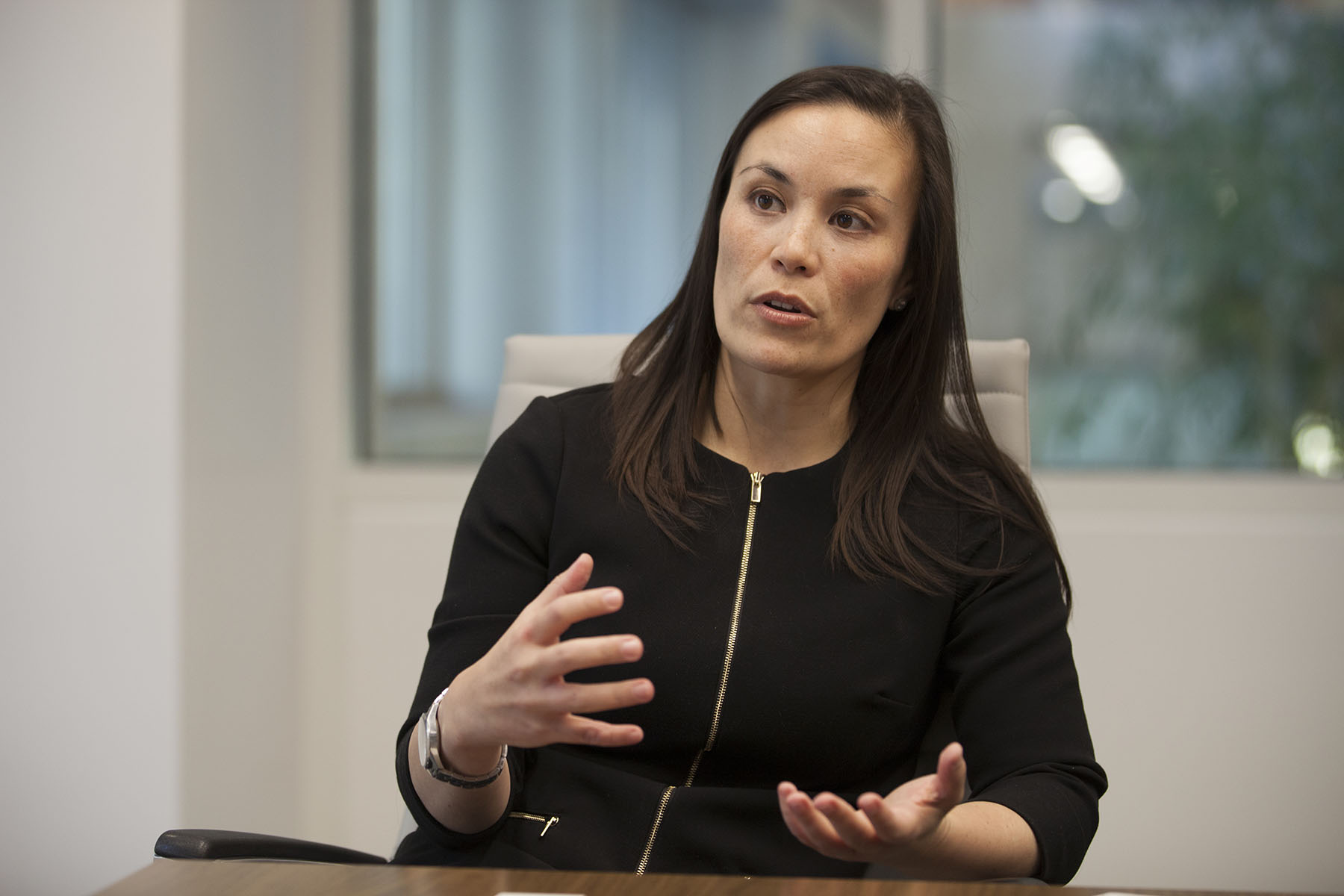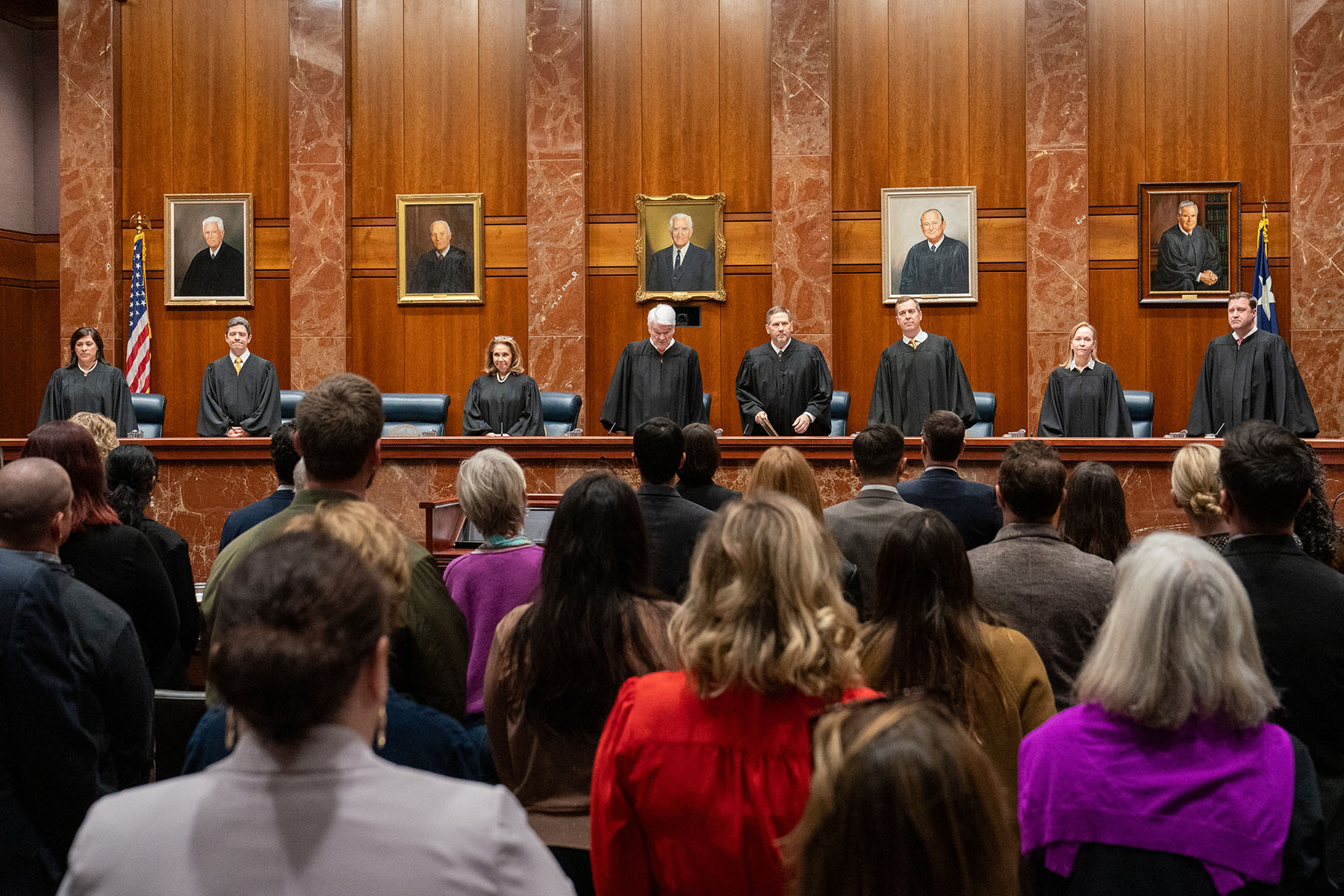Texas’ Supreme Court has taken center stage in interpreting the state’s abortion laws in cases that have garnered national attention. And a new Democratic political effort targets three justices who they say “fucked around” — and will “find out.”
Gina Ortiz Jones, a two-time Democratic congressional candidate and former under-secretary in the U.S. Air Force, launched the Find Out PAC to target Republican Justices Jimmy Blacklock, John Devine and Jane Bland, who are up for reelection in November.
Jones launched the PAC after the Texas Supreme Court’s high-profile ruling in December in the case of Kate Cox, the first adult in decades to petition a court to obtain an abortion. The Supreme Court blocked Cox, a Dallas-area mother of two, from getting an abortion in the state after her fetus was diagnosed with full trisomy 18, a chromosomal abnormality that is almost always fatal before birth or soon after. The pregnancy also posed severe risks to Cox’s health.
“The Kate Cox factor could change everything,” Jones said.
Elections for state supreme court justices, once largely obscure, have grown more expensive and high-profile in recent years after the U.S. Supreme Court gained a conservative supermajority and overturned Roe v. Wade in June 2022, sending abortion rights back to the states. The high court’s ruling in Dobbs v. Jackson Women’s Health Organization has meant some supreme court justices have more power in deciding the fate of abortion rights in their states.
Abortion had been banned in Texas for months before the Dobbs decision after its state legislature passed a first-of-its-kind law that allows private citizens to sue anyone who “aids or abets” an abortion after six weeks and promises successful litigants an award of at least $10,000. The law, which went into effect in September 2021, has no exceptions for rape, incest or the health of the pregnant person. Since then, numerous women and doctors have spoken out about the impacts of the bans. Jones said Texas is “giving the playbook for the entire country.”
The Find Out PAC’s goal, Jones said, is to direct voter anger over the state’s abortion bans to the state Supreme Court, whose nine justices are all Republicans.
“These justices, who we’re calling Jimmy, John and Jane, are deeply embedded in this far-right movement to strip rights from Texans and Americans,” said Democratic State Rep. James Talarico, a supporter of the effort. “They’re starting with reproductive rights, but they’re not going to stop there.”

The Find Out PAC and its supporters, which include multiple state and federal office holders, aim to elevate the public’s consciousness about the court, whose justices are elected to six-year terms and run under the banners of political parties.
“So much of this is opaque. So much of this is deliberately confusing to try to prevent folks from participating in the political process,” Talarico said. “And so our goal here is to educate and empower voters across our state to take back their freedoms.”
Jones doesn’t shy away from provocative and profane language in promoting her message.
“We’re going to talk about this issue in a way some people are not comfortable with,” Jones said. “It’s a big opportunity for us.”
In Find Out PAC’s launch video released in January, the narrator decries “political bullshit” driving the court’s abortion rulings.
“They’re about to see what happens when you fuck around,” the video says. “You find out.”
Unseating even one justice, however, is a tall order in a state like Texas. Despite coming close in some races, Texas Democrats haven’t successfully elected any statewide officials in 30 years. No Democratic justices have served on the state Supreme Court since 1998.
However, Jones and her allies in the effort see a longer strategy, including building out a powerful Democratic bench.
“We need leaders in Washington, in our statehouses, and, especially, on court benches who will put freedom first,” said Democratic Rep. Mikie Sherrill of New Jersey. “I am proud to support this fight.”
State Rep. Gina Hinojosa, who chairs Texas House Democrats’ campaign arm, argued Democrats have been “closing the gap” in the past presidential cycles. Strong judicial contenders, she said, can boost down-ballot candidates and provide a reverse-coattail effect to top-of-the-ticket candidates like President Joe Biden and U.S. Senate candidate Colin Allred.
“We’re basically in an environment where anything can happen,” Hinojosa said. “And so it’s really important that Democrats play, and play hard at every level.”
The lack of exceptions in Texas’ abortion ban has the potential to mobilize voters, Jones said.
A recent poll from the Texas Politics Project at the University of Texas found high support for more exceptions to the state’s abortion ban, with 80 percent of respondents supporting rape and incest exceptions and 73 percent of respondents backing exceptions if there is “a strong chance of a serious birth defect.” While voters’ views on current abortion laws were mixed, a plurality of 45 percent supported making laws less strict. Just four percent of voters, however, named abortion as the most critical issue facing Texas.
Conservative groups and political action committees will also focus on the courts in 2024. Jonathan Covey, director for policy at Texas Values Action, an influential conservative and anti-abortion PAC in the state, anticipates high spending and intense attention on the court. He said he believes the role of the courts is to interpret — not make — laws, and he ultimately expects Texans to “vote in line with the view that all life is precious.”
“Courts don’t magically just manifest laws into existence,” he said. “And in Texas, we have a conservative legislature that protects life.”
But women directly affected by the state’s abortion ban, like Elizabeth Weller and Lauren Miller, say their experiences in being delayed and denied care were not “pro-life” — or in line with Texan values.
“Politics is a passion of mine, especially since it’s so personal. I get fired up,” said Weller, who lives in the Houston area. In 2022, she was 19 weeks pregnant when her water broke prematurely, giving her pregnancy little to no chance of surviving. She endured multiple days of an infection before a medical ethics board approved her for an abortion.
“This is not pro-life. This is pro-torture,” she said.
Miller, a Dallas-area woman, was pregnant with twins when she learned one had trisomy 18. She couldn’t get an abortion in Texas and ended up traveling to Colorado for a fetal reduction.
“Texans are always really big on their independence,” Miller said. “To have this level of government overreach is just antithetical to everything it is to be Texan.”
Miller said that judges and judicial races have flown under the radar, even for people like her who consider themselves politically informed and engaged.
“What I’m really hoping is that folks are starting to realize the importance of the judiciary in shaping our lives,” Miller said.

Covey, however, doesn’t believe Cox’s case will move the needle toward unseating the justices.
“The other side is upset about the Cox decision, but actually, I think the court deserves praise for protecting children with severe disabilities,” Covey said. “I don’t expect that this will have an impact at the ballot box in terms of removing those judges who upheld the law and interpreted it correctly.”
But for Jones, Cox’s case illustrates how the court has let down the women who have placed their faith in the legal system. Another supporter of the effort, Harris County Judge Lina Hidalgo, said she’s “thrilled” the PAC will “hold Texas Supreme Court justices accountable” for their decision in Cox’s case.
A lower court judge in Austin issued a temporary injunction allowing Cox’s OB/GYN, Dr. Damla Karsan, to proceed with an abortion without facing prosecution. However, Texas Attorney General Ken Paxton moved to block the ruling in the state Supreme Court and sent letters to hospitals warning them that the injunction “would not insulate” them from liability. In the interim, as Cox faced more urgent health risks and complications from the pregnancy, she traveled to another state for care.
Cox and Karsan’s lawyers argued that Karsan should be allowed to provide an abortion if she believed “in good faith” that it was medically necessary. But the Supreme Court ruled against them, deciding Karsan needed to use the higher standard of “reasonable medical judgment.”
Jones said that under the laws in place in Texas: “There are going to be more Kate Coxes.”
Devine, the most vocally anti-abortion of the three justices being targeted, could be the most vulnerable in a general election. He was the only one to face a serious challenger in Texas’ March 5 primary, from a lower court judge, Brian Walker, who he defeated by just one point.
Devine, an anti-abortion activist before ascending to the bench, said he was arrested over 30 terms protesting at abortion clinics in the 1980s. He has also cast doubt on the separation of church and state and railed on the campaign trail against his fellow justices, who he called “brainwashed” in audio obtained by the Texas Tribune. Walker had criticized Devine’s judicial ethics and his decision to skip a substantial number of oral arguments to campaign.
Texas Values Action supported Devine in the primary, with Covey acknowledging it was a “closer” result but that he believes Devine has “upheld the law.” In November, Devine will face Democratic candidate Judge Christine Vinh Weems, who in 2022 issued a temporary restraining order blocking a 1920s-era Texas abortion ban.
“Based on Justice Devine’s recent race, I would expect there to be more of a challenge,” Covey said.
Both Jones and Weller say that they believe Texans further understanding the complexity and nuances of abortion will ultimately move their votes.
Working as a field organizer on a local political campaign last year allowed Weller to speak directly to voters across the political spectrum — and expand people’s ideas of what abortion is.
Weller was scared to get pregnant again after her experience. But talking to people “has been . . . kind of like an eye opener,” she said. If more people awaken to the reality of abortion, she said, “maybe something can change here.”
“What seemed to be impossible for me before is now becoming somewhat of a possibility in the future,” she said.







